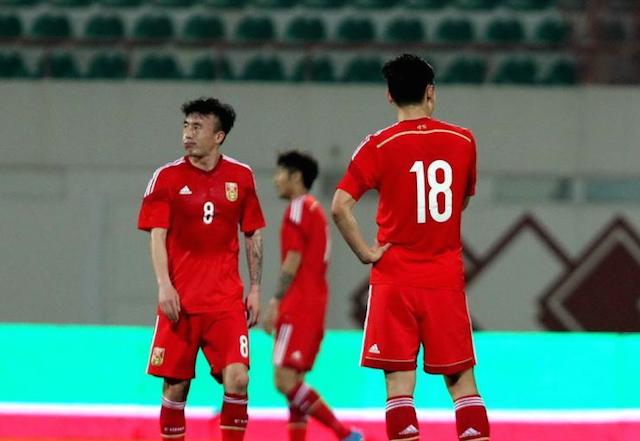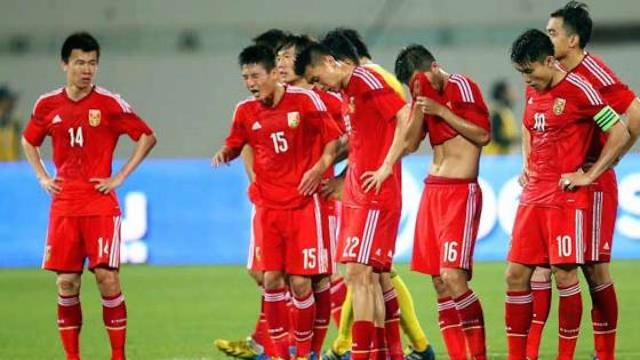It is now confirmed. China will attend the 2014 AFC Asian Cup in Australia next January, but will in effect do so as “lucky losers” having claimed the place offered to the best performing third-placed side in qualification. They earned that right ahead of Lebanon by virtue of one solitary goal, with Thailand’s Adisak Kraisorn now Chinese football’s saving grace after his late goal ensured China’s qualification. That China should come so close to missing out on Asia’s premier competition is, quite simply, embarrassing for all concerned.
Had they failed to qualify, attention would quite justifiably have fallen upon missed opportunities against Indonesia and, in November, Saudi Arabia. On both occasions points were there to be won for China, but a lack of courage and conviction from the team’s management saw both games end in a draw. Wednesday night’s game in Iraq once more highlighted that lack of courage that surrounds the side, but was a far more concerning affair all together.
Any criticism of China is, of course, not to take away from the quality of Iraq. At youth level, the war-torn nation is performing wonderfully well and they have been a difficult opponent at senior level for several years, winning the 2007 Asian Cup. Left-back Ali Adnan, in particular, looks to have the potential to go on and become a leading Asian star over the coming years, having made his breakthrough at last summer’s Under-20 World Cup. On Wednesday, though, their task was made easy for them by a China side devoid of fight, tactical awareness and quality.
It can, at times, become difficult to defend Chinese football. The rot starts right from the very top of the game within the Football Association and permeates right down to grassroots level, as has been discussed many times over recent years. However, China is not the only country whose footballing system is deeply flawed and many have gone on to achieve success. What’s more, Chinese football is not devoid of talent and, as Guangzhou Evergrande’s success has shown, its players can appear tactically refined and composed when prepared correctly. The entire setup around the national team, though, needs examining as to its effectiveness for preparing a side for international competition.

At times China’s players appeared to have no answer to the problems
On the night, the performance was a sorry mess. Suspensions to Zhang Linpeng and Sun Xiang meant that a back four consisting of three players whose regular position at club level is in midfield, plus a woefully out of form Feng Xiaoting, took the field. Feng, it should be added, has been consistently below par for club and country for the best part of a year. In midfield, any semblance of selection being based on merit was removed with the omission of the Chinese Super League’s best two domestic players in Wu Lei and Zhang Xizhe, as well as Jiangsu Sainty’s Sun Ke, who performed impressively for China in 2013. Unsurprisingly, the trio’s second half introduction was the catalyst for a period of Chinese pressure on Iraq’s goal and the side’s eventual consolation effort from the penalty spot.
There has been and will continue to be a lot of finger pointing in coming days, with some of the side’s older players bound to have their selections questioned. Gao Lin had the best season of his club career for Evergrande last year, but has not performed for China in some time. Zheng Zhi, an able deputy at centre-back, is somewhat wasted in the role. Yang Hao, meanwhile, does little to convince he is of national team level. More trust in youth is a must, but selections cannot continue to be based on reputation and familiarity alone. A core has been established within the China camp and there is a suggestion that some talented players outside of that group are not welcomed into the national side. Politics, it would seem, hold sway once more.
Confidence and belief will only come with better results, but there needs to be a cultural change within the national team setup. Talk of Fu Bo’s side “studying Barcelona” from members of the management team last year was unnecessary and only added to the burden upon the team’s shoulder. At times last year they did keep the ball well and attempt to play expansive football, but there is a fear to everything the team does that is prohibitive to developing a more attacking style. It is the same fear that sees the same faces repeatedly recalled to the side regardless of their performance levels.
The debate as to how Chinese football must change to develop more talent and a thriving footballing culture has raged for several years and action has been taken to rectify some of those criticisms. While focus has rightly been on youth and grassroot football, though, poor performances at elite level have been accepted. After all, it takes time to bring through talent and change footballing culture. However, it cannot be overlooked that the potential of the current generation is not being reached and that the confused nature of the CFA’s management of the national side is largely responsible.
China bizarrely managed to enter this game with two managers in place, neither of whom will be wishing to claim the result as their own. A change of attitude is needed under Alain Perrin and those in Dubai have clearly reported his disgust at the team’s first-half performance. He needs to be allowed to take the team in his own direction, though, and choose the players that he best sees fit, as well as to decide upon preparation plans. Whatever anyone may think of his appointment, he is a football man and understands the game better than most within the CFA or Sports Bureau. Too often in recent years, the whims of politicians have been influential on team decisions and the side has suffered as a result. Marcello Lippi, had he been appointed, would have insisted upon full control of team affairs. For the sake of the team, Perrin must now be equally firm in his stance.
